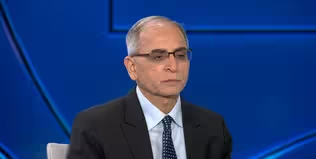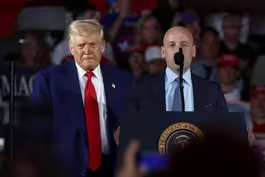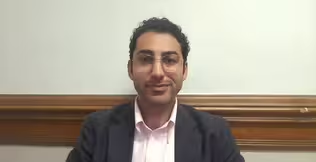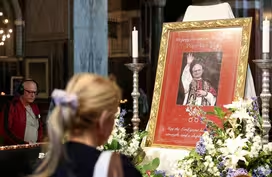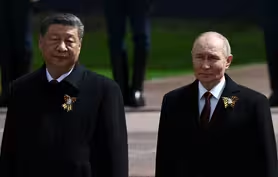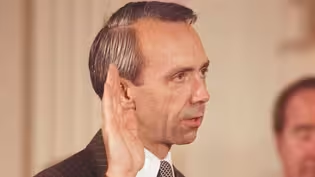
Brooks and Capehart on Pope Leo's impact on U.S. politics
Clip: 5/9/2025 | 10m 44sVideo has Closed Captions
Brooks and Capehart on Pope Leo XIV's potential impact on U.S. culture and politics
New York Times columnist David Brooks and Washington Post associate editor Jonathan Capehart join Geoff Bennett to discuss the week in politics, including the election of the first American pope and his potential impact on U.S. culture and politics, former President Biden's media tour and Supreme Court justices defending an independent judiciary.
Problems playing video? | Closed Captioning Feedback
Problems playing video? | Closed Captioning Feedback
Major corporate funding for the PBS News Hour is provided by BDO, BNSF, Consumer Cellular, American Cruise Lines, and Raymond James. Funding for the PBS NewsHour Weekend is provided by...

Brooks and Capehart on Pope Leo's impact on U.S. politics
Clip: 5/9/2025 | 10m 44sVideo has Closed Captions
New York Times columnist David Brooks and Washington Post associate editor Jonathan Capehart join Geoff Bennett to discuss the week in politics, including the election of the first American pope and his potential impact on U.S. culture and politics, former President Biden's media tour and Supreme Court justices defending an independent judiciary.
Problems playing video? | Closed Captioning Feedback
How to Watch PBS News Hour
PBS News Hour is available to stream on pbs.org and the free PBS App, available on iPhone, Apple TV, Android TV, Android smartphones, Amazon Fire TV, Amazon Fire Tablet, Roku, Samsung Smart TV, and Vizio.
Providing Support for PBS.org
Learn Moreabout PBS online sponsorshipGEOFF BENNETT: From the election of the first American pope to the Supreme Court justices, some of them defending an independent judiciary, lots to discuss tonight with Brooks and Capehart.
That's New York Times columnist David Brooks and Jonathan Capehart, associate editor of The Washington Post.
Great to see you both.
JONATHAN CAPEHART: Hey, Geoff.
GEOFF BENNETT: So, the election of this new pope, the first American pope, provides a fresh lens to discuss the influence of religion our politics, especially Trumpism.
And, David, this might be the first pope with a social media trail, because, before he became Pope Leo, Cardinal Robert Prevost occasionally posted on social media.
His posts and reposts have been dissected by many, criticized by some of those on the right.
And his posts have suggested that he supports protecting immigrants, reducing gun violence, combating climate change, certainly in line with the Gospel, maybe not in line with right-wing politics.
What questions, if any, does this really pose for the faithful who also see themselves as being Trump supporters?
DAVID BROOKS: First, I just say I found it incredibly moving to watch him give his first remarks as pope, in part because here I was watching an American on the world stage being a decent human being and being a good person.
So I found it so just refreshing to see America portrayed in this way by this man.
Secondly, I think the cardinals did a brilliant thing in selecting an American, which was so unexpected.
But a couple decades ago, when the Soviet Union was the chief problem area in the world, the cardinals selected John Paul II, a Pole, and he was -- helped end communism.
Now America is the most troubled nation the world, and they select an American who represents Catholic social teaching, who represents a series of teaching about the marginalized, about the dignity of all human people, about welcoming the stranger.
And they knew what they were doing.
They picked somebody -- if Donald Trump is about pagan values, about dominance, power, control, victory, conquest, here's a guy about blessed are the poor in spirit, blessed are the meek.
And that's a complete social change and a moral challenge to Trumpism.
And the final thing I will say is that, during World War II, in the middle of the 20th century, there was communism on one side, there was capitalism on the other side, these two machines.
And the Catholics gave us a system in the middle there which they called personalism, a guy named Jacques Maritain, Emmanuel Mounier.
And that was a more humane version to combat the dehumanizing processes that were afflicting left and right.
And so who knows, but this pope could be a real moral force in the country and especially in America.
GEOFF BENNETT: A real moral force.
Where do you land on this, Jonathan?
JONATHAN CAPEHART: Well, one, I could not help but think of Pope Leo XIV while reading David's column in The New York Times.
But my immediate thought after saying, oh, my gosh, it's an American pope, I instantly thought, but looking at it politically to your point, David, I thought, this is kind of -- how could I not look at this as an incredible rebuke to the American president?
Because here you have an American pope who is as a leader in the world going to go toe to toe with the American president who, from everything we have seen, is the complete opposite of the Holy Father.
And so the question then becomes, what do American Catholics do when they have an American pope who speaks the teachings of Jesus Christ, all the things that David was talking about, and yet they have been supporting a man who is antithetical to all of those things?
To me, I look forward to Pope Leo XIV, but I really look forward to seeing what American Catholics do in response.
GEOFF BENNETT: Yes.
Well, from the pope to former President Biden, there is a through line there since, Biden is the most devout Catholic... DAVID BROOKS: OK. GEOFF BENNETT: ... ever to... GEOFF BENNETT: The second Catholic elected, but certainly the most devout, you could argue.
Anyway, President Biden's been on something of a media tour.
He's speaking with the BBC.
He appeared on "The View," offering this counter to President Trump's agenda while trying to shape his own legacy.
In one interview, he said he wasn't surprised that Vice President Harris lost.
He cited racism and sexism playing a role in that.
But he says he believes he could have beaten Donald Trump.
Is he right about that?
And is there any sort of strategic value in saying that out loud right now?
DAVID BROOKS: You know, I think he's empirically wrong about that.
Kamala Harris ran about as good a campaign as she could.
She was saddled with the Biden legacy, an unpopular presidency.
Biden would have been saddled by that legacy in addition to his age.
So you take those two factors, it's hard to see how he wins.
But he's a man with a -- he's proud man with a chip on his shoulder who feels himself under attack, frankly, in the Democratic Party and the Republican Party.
And so he wants to stand up for himself.
I would only counsel him as someone, who's a longtime admirer of Joe Biden, is that what we want from our presidents is not more politics.
What we want from our presidents is somebody who's post-politics, who can speak to us from a higher level, not in the partisan mud.
And Jimmy Carter did that.
I think George W. Bush has done that through his painting.
You do a book of paintings about immigrants, you do a book about paintings about veterans, you have expressed a set of values without being political.
And if I were -- if Joe Biden ever called me to say, what should you do with his post-presidency, which is probably not going to happen... JONATHAN CAPEHART: You never know.
DAVID BROOKS: You never know.
And I would say, be post-political, rise above it and don't get back in - - don't try to fight old battle.
GEOFF BENNETT: Well, the president said - - the former president said he's trying to figure out a way that he can be - - what did he say?
Figure out the most significant and consequential role he can play moving forward.
So where could he have the most impact, do you think?
JONATHAN CAPEHART: I think he could have the most impact by just speaking the truth vis-a-vis what's happening right now.
I mean, I think one of the things that the president did, I watched his interview on "The View," he defended his record.
And there is a significant record to defend, especially now that we're more than 100 days into a second Trump presidency, all the things that have run counter to that.
But there's one thing that we have to remember.
There's a book coming out on May 20 that is going to cast a very negative light on the Biden presidency, the people around him, and what the authors allege they did to -- quote, unquote -- "cover up" something involving the president's health and his mental acuity.
Going on the BBC, going on "The View," doing these extensive interviews is basically a prebuttal.
Say, you think there's something wrong with me?
I'm sitting here, I'm talking, I'm defending my record.
You can ask me whether I could beat -- whether I could have beaten Donald Trump?
Of course he thinks he could have beaten Donald Trump.
He's the only person in America who has actually done it.
And so I just wish folks in our profession would just stop asking the man that question and get him to talk about the things he did and how they're being eroded by his successor.
GEOFF BENNETT: In the time that remains, let's talk about these public remarks from the Supreme Court justices defending the role of the judiciary.
First, we have Justice Ketanji Brown Jackson.
She warned that attacks on judges undermine democracy.
She says: "Across the nation, judges are facing increased threats of not only physical violence, but also professional retaliation just for doing our jobs.
And the attacks are not random.
They seem designed to intimidate those of us who serve in this critical capacity."
Justice Sonia Sotomayor addressed a gathering of the American Bar Association.
And she said: "Our job is to stand up for people who can't do it themselves.
We need trained and passionate and committed lawyers to fight this fight.
For me, being here with you is an act of solidarity."
Add to that Chief Justice John Roberts, he did a fireside chat in his hometown.
Here's what he had to say.
JOHN ROBERTS, Chief Justice of the U.S. Supreme Court: But, in our Constitution, judges and the judiciary is a co-equal branch of government.
And its job is to obviously decide cases, but, in the course of that, check the excesses of Congress or of the executive.
And that does require a degree of independence.
GEOFF BENNETT: And yet you could argue that the Roberts court afforded Trump a shield against prosecution for crimes in office, elevating him to a king-like status above the other branches.
What do you make of all this?
DAVID BROOKS: Yes, I mean, people have different interpretations about executive power.
And I think the this court has decided the executive controls the executive branch.
But that doesn't mean this court believes the executive controls the whole government.
And they clearly don't.
I have conversations.
I have had a lot of conversations over the last few weeks, how bad are things?
Are we hanging on there and our institutions holding up, or are we over the waterfall and we're just in freefall?
And different people have different views.
I'm still on the, we're not over the waterfall yet.
We're still hanging on there because our institutions are holding.
And among the institutions that are holding are the courts.
And to hear these three justices come out very assertively, say we're a co-equal branch of government, we're doing our job, we're not going to stand up for this intimidation campaign, that to me is very cheering that the courts -- and I think, on the whole, the courts, Trump appointees and non-Trump appointees, have been pretty good about standing up for the Constitution.
JONATHAN CAPEHART: We might not have gone over the waterfall, but we are in the barrel.
And we're getting very close.
And while it is wonderful to have three members of the Supreme Court, including the chief justice, saying the things that they're saying, I'm curious to see what do they do when the president of the United States openly defies a direct order, a direct ruling from them.
And the fact that I'm not confident in what they will do should concern a lot of folks.
It concerns me, I mean.
GEOFF BENNETT: We should also mark the passing of retired Supreme Court Justice David Souter.
His tenure is often cited as a reminder that justices once confirmed are not beholden to the presidents who appoint them.
What stands out to you about his time on the court?
DAVID BROOKS: Well, I like the fact he was a guy who never really came here.
Like, not all people who go to -- come to Washington, like, come of Washington, he was separate.
But he became a symbol in the Republican Party for a thing the Republicans call growing in office, which meant growing more liberal when you come to Washington.
And after Souter appeared to grow in office, though I think he was always pretty consistent, they were never going to nominate somebody who could evolve to the left.
And so they have picked a much more hardcore set of justices because of the Souter model.
GEOFF BENNETT: Jonathan?
JONATHAN CAPEHART: The thing that stands out to me the most about Justice Souter was the fact that he left the court when he was relatively young.
GEOFF BENNETT: It is remarkable, isn't it?
JONATHAN CAPEHART: Sixty-nine years old.
And, to me, that speaks to a selflessness and sort of a person who knew who he was and knew what he wanted to do and what he didn't want to do.
When he decided he didn't want to be on the court anymore, he left.
GEOFF BENNETT: Jonathan Capehart, David Brooks, thanks to you both.
JONATHAN CAPEHART: Thanks, Geoff.
DAVID BROOKS: Thank you.
India's U.S. ambassador on escalating conflict with Pakistan
Video has Closed Captions
Clip: 5/9/2025 | 7m 11s | India's U.S. ambassador discusses the escalating conflict with Pakistan (7m 11s)
Miller suggests suspending habeas corpus to deport migrants
Video has Closed Captions
Clip: 5/9/2025 | 3m 55s | Top Trump adviser suggests White House could suspend habeas corpus to deport migrants (3m 55s)
Mohsen Mahdawi says release shows democracy is functioning
Video has Closed Captions
Clip: 5/9/2025 | 8m 5s | 'This is a light of hope': Mohsen Mahdawi says release shows democracy is functioning (8m 5s)
Pope Leo's longtime friend on what to expect from his papacy
Video has Closed Captions
Clip: 5/9/2025 | 6m 48s | Pope Leo XIV's longtime friend shares insights on what to expect from his papacy (6m 48s)
Putin uses WWII celebration to strengthen ties with China
Video has Closed Captions
Clip: 5/9/2025 | 5m 23s | Putin uses Russia’s WWII celebration to strengthen alliance with China (5m 23s)
Remembering David Souter and his Supreme Court legacy
Video has Closed Captions
Clip: 5/9/2025 | 4m 20s | Remembering Justice David Souter and his Supreme Court legacy (4m 20s)
Providing Support for PBS.org
Learn Moreabout PBS online sponsorship
- News and Public Affairs

FRONTLINE is investigative journalism that questions, explains and changes our world.

- News and Public Affairs

Amanpour and Company features conversations with leaders and decision makers.












Support for PBS provided by:
Major corporate funding for the PBS News Hour is provided by BDO, BNSF, Consumer Cellular, American Cruise Lines, and Raymond James. Funding for the PBS NewsHour Weekend is provided by...
